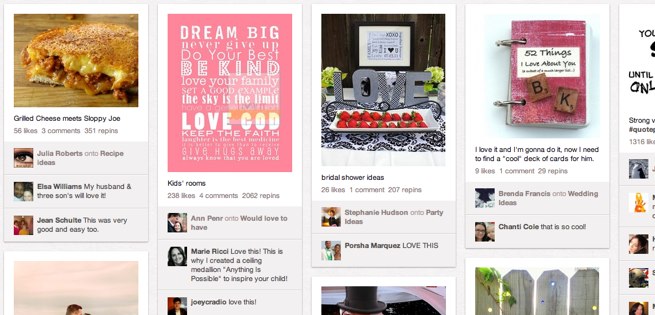
By way of the “pin,” accidental thieves have exchanged copyrighted content on digital pin-board site Pinterest. To thwart any lawsuits in the making, the much talked-about startup is giving disgruntled site-owners a way to stop piracy before it starts by blocking their images from showing up on Pinterest.
[aditude-amp id="flyingcarpet" targeting='{"env":"staging","page_type":"article","post_id":393081,"post_type":"story","post_chan":"none","tags":null,"ai":false,"category":"none","all_categories":"business,social,","session":"C"}']Pinterest is the up-and-coming social site that encourages members to “pin,” via bookmarklet, items they love to collections called boards. In about a year’s time, the site has grown into one of the most-trafficked social networks.
The acts of “pinning” and “repinning” (re-sharing a pin created by another user) have come under fire, especially in photographer circles, as tools for copyright infringement. Members can easily grab copyrighted works from photo-sharing or media sites and clip them to their boards. Pinned images often include attribution, but sources later get lost in the shuffle, and some members go on to use images on their blogs or websites. Plus, considering that Google is the second most popular source of pins, a sizable percentage images are likely misattributed.
AI Weekly
The must-read newsletter for AI and Big Data industry written by Khari Johnson, Kyle Wiggers, and Seth Colaner.
Included with VentureBeat Insider and VentureBeat VIP memberships.
Now, Pinterest is providing website owners a simple snippet of code, located in the updated help section of the site, to help them nip unwanted sharing in the bud.
“We care about respecting the rights of copyright holders. We work hard to follow the DMCA procedure for acting quickly when we receive notices of claimed copyright infringement,” co-founder Ben Silbermann wrote in a blog post Wednesday. “We understand and respect that sometimes site owners do not want any of their material pinned.”
The new code, when added to the header of any page, will prevent a person of Pinterest from sharing content from that page. If someone attempts to pin something from a site with that code in place, she will see a message that reads: “This site doesn’t allow pinning to Pinterest. Please contact the owner with any questions. Thanks for visiting!”
The code should help the anti-Pinterest photographers and publishers of the world keep some of their copyrighted works off of the site, though it certainly won’t prevent the motivated sharer from downloading and re-uploading materials to Pinterest themselves.
Perhaps more importantly, though, the proactive measure could help Pinterest defend itself from copyright litigation. At the very least, the young company can now argue that it does not actively enable or encourage infringement.
VentureBeat's mission is to be a digital town square for technical decision-makers to gain knowledge about transformative enterprise technology and transact. Learn More
